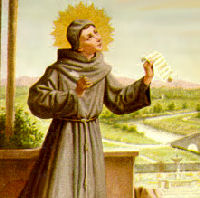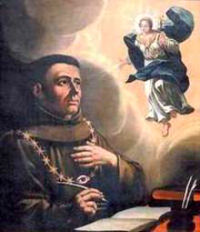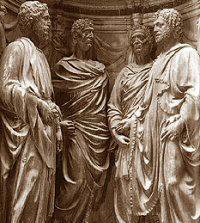
Daily Readings for: November 08, 2012
(Readings on USCCB website)
Collect: Almighty and merciful God, by whose gift your faithful offer you right and praiseworthy service, grant, we pray, that we may hasten without stumbling to receive the things you have promised. Through our Lord Jesus Christ, your Son, who lives and reigns with you in the unity of the Holy Spirit, one God, for ever and ever.
- Death and Burial
- November and the Holy Souls
- Practical Suggestions for Christian Living (Anointing of the Sick)
- Praying for the Dead and Gaining Indulgences During November
- Prepare for Death
- Preparing for Heaven
- Religion in the Home for Elementary School: November
- Religion in the Home for Preschool: November
- Teaching About Death
- Teaching Children About Sickness and Death
- November Devotion: The Holy Souls in Purgatory
- Little Litany of the Holy Souls
- Prayer for a Happy Death
- Daily Acceptance of Death
- Address of John Paul II to the Members of the Scotus Commission | Pope John Paul II
- Faith and Reason Together in the Thought of Duns Scotus | Pope Benedict XVI
- Historical Development of the Dogma of the Immaculate Conception | Rev. Francis J. Connell C.SS.R.
- John Duns Scotus | Pope Benedict XVI
- John Duns Scotus: Champion of the Immaculate Conception | Brother John M. Samaha S.M.
RECIPES
ACTIVITIES
PRAYERS
LIBRARY
Ordinary Time: November 8th
Thursday of the Thirty-First Week in Ordinary Time; Bl. John Duns Scotus,
Newly beatified in 1993 by John Paul II, the Franciscans and other particular calendars may celebrate the optional memorial of Blessed John Duns Scotus, a Scottish Franciscan priest and theologian who died in 1308. He was the founder of the Scotistic School in Theology, and until the time of the French Revolution his thought dominated the Roman Catholic faculties of theology in nearly all the major universities of Europe. He is chiefly known for his theology on the Absolute Kingship of Jesus Christ, the Immaculate Conception of the Blessed Virgin Mary, and his philosophic refutation of evolution. He is also known as the "Doctor of Mary Immaculate" because of his defense of the Immaculate Conception.
According to the 1962 Missal of Bl. John XXIII the Extraordinary Form of the Roman Rite, today is the commemoration of the Holy Four Crowned Martyrs, a group of five Christian sculptors of Hungary, martyred under Diocletian in 306. Their bodies were taken to Rome, where a biographer's error confused them with four martyrs of Albano. The basilica of the four crowned saints, built on the Coelian Hill, is one of the most characteristic of medieval Rome.
Don't forget to pray for the Poor Souls in Purgatory from November 1 to the 8th.
Bl. John Duns Scotus John Duns Scotus was probably born in the winter of 1266 in the South of Scotland. Around 1279 he was accepted in a Franciscan friary in South Scotland. After eight years of preliminary studies in philosophy, or rather in the artes, at Oxford, he started to study theology there in 1288. Having attained the age of 25 he was ordained a priest in Northampton on March 17th 1291.
John Duns Scotus was probably born in the winter of 1266 in the South of Scotland. Around 1279 he was accepted in a Franciscan friary in South Scotland. After eight years of preliminary studies in philosophy, or rather in the artes, at Oxford, he started to study theology there in 1288. Having attained the age of 25 he was ordained a priest in Northampton on March 17th 1291.
In the academic year 1297-98 John Duns prepared his first theological course which would change his life. During the next year he gave this course, on the Sentences of Peter Lombard, the most important textbook of systematic theology at the time. During these years (1297-99) Duns wrote Lectura I-II, his lecture notes on the two first books of the Sentences. Scotus' course based on these notes not only impressed his audience very much, but also the Franciscan leadership, and established his name as an exceptionally penetrating and original thinker.
In the summer of 1301 Scotus had fulfilled all the requirements for being a master (magister). However, he was sent to Paris by the Franciscan leadership in order to continue a Parisian career, at the most prestigious university of Europe.
After having again taught on the Sentences for a year, he and some of his colleagues were banished in June 1303 from Paris because of a conflict between the French king Philip IV and Pope Boniface VIII. He returned to his studium at Oxford and probably spent the first half of 1304 in Cambridge.
At the end of the summer of 1304 he was already back in Paris where he became professor of theology in 1306. Duns Scotus and his socius continued to work very hard on his Ordinatio together with a staff of assistants. The Ordinatio was meant to be the definitive edition of his Commentary on the Sentences. For this edition he used his Lectura I-III and Reportatio Parisiensis IV and piles of other materials he had prepared in the meantime.
In 1307 Duns leaves Paris again, but this time he left for Cologne in order to become the professor of theology at the Franciscan House of Studies (Studium). On November 8, 1308 he suddenly died in Cologne, leaving behind quite a number of unfinished works, including his Ordinatio.
Excerpted from Research Group John Duns Scotus
Things to Do:
- Learn more about Bl. John Duns Scotus from EWTN and the Catholic Encyclopedia.
- Read A Treatise on God as First Principle by Bl. John Duns Scotus.
Holy Four Crowned Martyrs The history of these holy martyrs is very confusing. The Martyrology has this: "At Rome on the Via Lavicana the day of the death of four holy martyrs, the brothers Severus, Severianus, Carpophorus, and Victorinus. Under Emperor Diocletian they were scourged to death with lead rods. Their names were first made known many years later through a divine revelation. As no one knew their names previously, the annual feastday to their honor was celebrated under the title: The Four Crowned Brothers. The designation was retained even after the revelation."
The history of these holy martyrs is very confusing. The Martyrology has this: "At Rome on the Via Lavicana the day of the death of four holy martyrs, the brothers Severus, Severianus, Carpophorus, and Victorinus. Under Emperor Diocletian they were scourged to death with lead rods. Their names were first made known many years later through a divine revelation. As no one knew their names previously, the annual feastday to their honor was celebrated under the title: The Four Crowned Brothers. The designation was retained even after the revelation."
The basilica of the Four Crowned Martyrs also contains the relics of five sculptors who under Diocletian refused to make idols or to venerate sun-god pictures. Reports say they were scourged, placed in lead coffins and submerged in a stream (c. 300). Hagiographers are trying to disentangle the conflicting statements on the relation of these two groups to one another, whether two groups actually existed, whether they were Pannomians or Romans, soldiers or stone-masons, etc.
Excerpted from The Church's Year of Grace, Pius Parsch
An indulgence, applicable only to the Souls in Purgatory, is granted to the faithful, who devoutly visit a cemetery and pray, even if only mentally, for the departed. The indulgence is plenary each day from the first to the eighth of November; on other days of the year it is partial.
A plenary indulgence, applicable only to the Souls in Purgatory, is granted to the faithful, who on the day dedicated to the Commemoration of All the Faithful Departed [November 2 {as well as on the Sunday preceding or following, and on All Saints' Day}] piously visit a church. In visiting the church it is required that one Our Father and the Creed be recited.
To acquire a plenary indulgence it is necessary also to fulfill the following three conditions: sacramental Confession, Eucharistic communion, and prayer for the intention of the Holy Father. The three conditions may be fulfilled several days before or after the performance of the visit; it is, however, fitting that communion be received and the prayer for the intention of the Holy Father be said on the same day as the visit.
The condition of praying for the intention of the Holy Father is fully satisfied by reciting one Our Father and one Hail Mary. A plenary indulgence can be acquired only once in the course of the day.